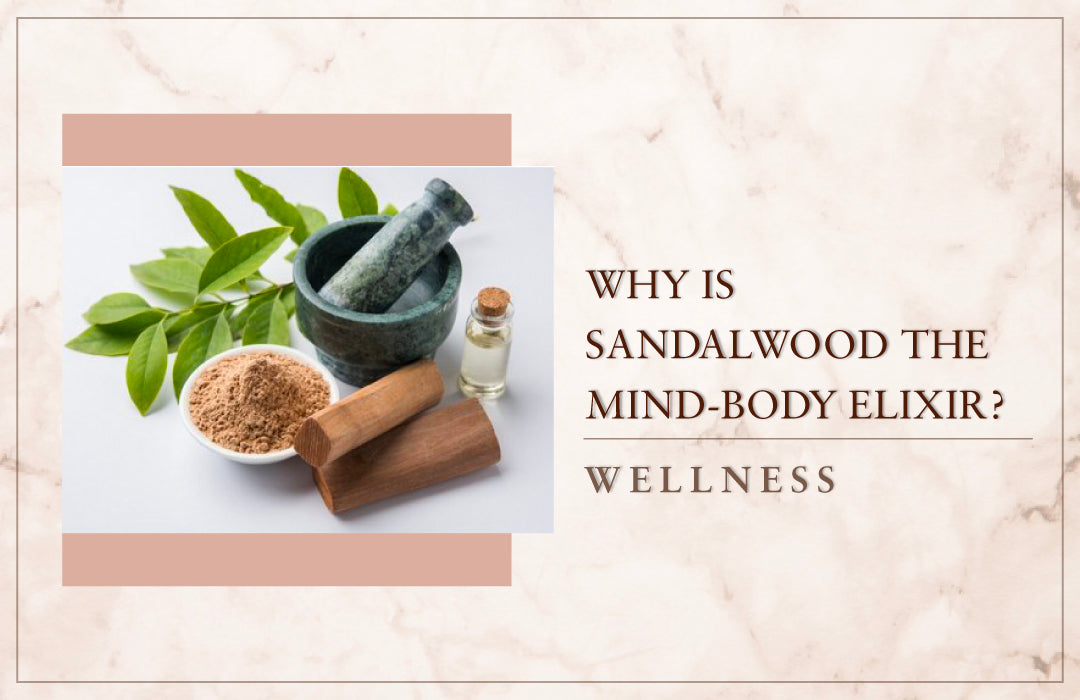If your mind is inflamed (irritated, angry or lost), light up a sandalwood incense stick or pour a few drops in the diffuser, and if your skin is inflamed (red, swollen or bumpy) apply some sandalwood paste. Also known as Chandan, sandalwood is one of the most effective healing ingredients for the body, mind and soul.
Ganesh Chaturthi is just around the corner, and homes and neighbourhoods have started the initial preps to welcome the god of wisdom, success and good luck. The scent of sandalwood and camphor lingers in the air. According to a myth, Goddess Parvati created Ganesha out of the sandalwood paste she would use for bathing. She breathed life into him and acknowledged him as her son. And this is just the start of the story. But today, we are not talking about myths, but its importance in Ayurveda. Sandalwood is one of the core ingredients in Ayurvedic remedies as it works from the inner spirit outward, healing the body and the mind.

Sandalwood is thought to bring one closer to the divine, and perhaps that’s why it’s a part of all religious ceremonies, whether in the form of incense sticks or paste. The tradition of wearing sandalwood paste on the foreheads as a tilak, though a religious ritual, has spiritual connotations. The yogis and priests believed that it protects the aura and calms the mind. The Egyptians used sandalwood oil in embalming the dead bodies.
According to aromatherapy, inhaling the scent of sandalwood or absorbing it through the skin is believed to communicate messages to parts of the brain involved in controlling emotions. So, if you are experiencing anxiety, indecisiveness or fear, sandalwood incense or essential oil should be your go-to. The highly uplifting aroma of sandalwood prevents the mind from wandering and helps it to focus on the present. The modern spiritual healers also believe this facilitates the potency of positive affirmations and visualisation techniques as the mind gets in an upbeat and positive space. In other words, sandalwood is like a natural feel-good drug that can control feelings of negativity (despair, hopelessness, grief, anger, etc) and turn around your emotions, by relaxing and calming the mind. That’s why perhaps many Indian households begin the day by lighting a sandalwood incense stick, which is a simple way to realign the brain to remain alert and focused through the day.
Sandalwood heals the body…
It’s not only the nose, but skin cells also have olfactory receptors. The reason why the scent of sandalwood promotes wound healing. “The therapeutic properties of sandalwood are attributable to sesquiterpenoids, mainly santol, which has been scientifically found to be an effective chemo-preventive agent in skin cancers,” states Dr Neena Chopra, co-founder Just Herbs. In traditional Chinese Medicine, sandalwood oil was used to relieve mental disorders as well as physical ailments such as insomnia, urinary tract infections, indigestion, amongst others. Sandalwood famed as an effective aphrodisiac is also used in Ayurveda and Chinese medicine to treat low libido.

In Ayurvedic texts, sandalwood or Chandan has been classified as one of the Varna Dravyas (complexion-promoting) by Archarya Chakra. Its Ayurvedic attributes of being cold in potency and its bitter-sweet after taste impart Kapha-pitta pacifying properties.
Here’s why it is also good for your skin, shares Dr Chopra:
-
Sandalwood has antiseptic and anti-inflammatory benefits, which helps to calm acne. Sandalwood oil when used on skin soothes, relieves itching, prickly heat and inflammations, says Dr Chopra. Watch out for this calming ingredient in your scrubs, cleansers and face masks.
-
Sandalwood is a natural antiperspirant and deodorant. Go for sweet-smelling sandalwood based body scrub or body cleansers to have not just smooth and supple skin, but also control overactive sweat glands.
-
Sandalwood is also very effective in dry and dehydrated skin conditions like dry eczema. Its mild astringent action has a toning and tightening effect on the skin.
READ MORE:








